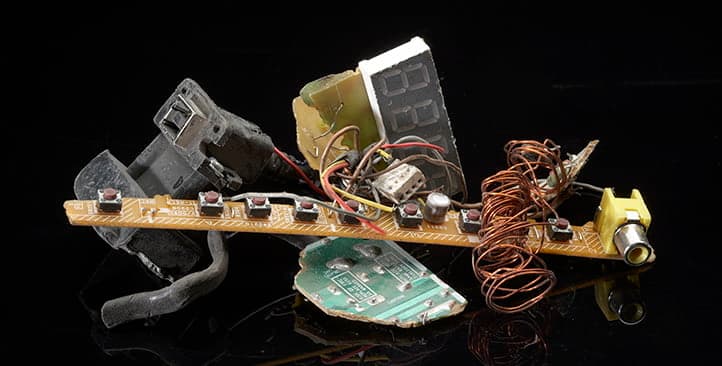
MERC - Metropolitan Electronics Recycling Center, South Korea
A better value product by replacing DMS by sensor-based sorting – Separating WEEE in South Korea
Overview of Korea's Metropolitan Electronics Recycling Center
The client was the Korea Electronics Recycling Cooperative – the body acting as Korea's WEEE (Waste Electrical and Electronic Equipment) association. They had direct responsibility for managing the Metropolitan Electronics Recycling Center (MERC), located in Yongin, Korea. This plant first became operational in 2003.
The material to be processed was general electronic and refrigerator scrap. These components were direct outputs from the plant's existing shredders. This plant recycled 21,000 tons per year, and until January 2015, used a gravitation separator to sort this throughput of material.
Though reasonably effective in achieving component separation, MERC's mechanical separation process had limitations in terms of the degree and quality of its final output of recovered material. The deployment of TOMRA's modern waste-sorting technologies was planned to increase sorting efficiency, raising the quality and the value of the plant's output.
Specified objectives for introducing sensor-based sorting
The client wished to replace the MERC plant's existing mechanical treatment equipment with a more efficient sensor-based sorting system. The existing equipment separated waste using dense media separation (DMS) technology, which relies upon utilizing the different specific gravities of the input material to achieve component separation. The introduction of a sensor-based sorting system, using TOMRA's AUTOSORT™ and COMBISENSE™ machines, was designed to realize two primary objectives:
- To improve the separation of plastics – for the first time making it possible to make a detailed recovery of plastics, for example, according to their different colors and polymer types;
- To upgrade the quality of the copper and aluminum fractions recovered.
In each case, it was anticipated the outcome of these improvements would have a markedly positive impact upon the value of the recovered materials. Given that there is a continuously growing demand for premium-quality e-scrap, these upgrades would also improve the economic viability of MERC's e-waste process. These aspirations fully reflected the Korean government's Eco-Assurance initiatives, encouraging the methodical management of e-waste and the adoption of a responsible 'life-cycle approach' to the purchase and eventual disposal of consumer products.

TOMRA-formulated solution
As from 01 January, 2015, a system utilizing TOMRA´s sensor-based based sorting equipment was installed at the MERC plant in Yongin. This upgrade replaced the previous system which relied upon mechanical sorting via the relatively unsophisticated method of DMS gravitational separation. The new equipment introduced modern processing methods which were simply beyond the capabilities of the original system units.Every sorting task has its own unique features. Beginning at the planning stage, TOMRA engineers began by carefully analyzing the composition of the input. For the MERC location, this consisted of both general electronic- and refrigerator scrap, which had already undergone pretreatment and upstream shredding.
Detailed information was gathered concerning the bulk weight of inputs and the level of impurities present. In addition, the precise nature of the final-output material was decided upon in consultation with the client.
Having clarified the inputs and determined the specified outputs, TOMRA's engineers devised an optimum solution which called for the deployment of an AUTOSORT™unit working alongside a COMBISENSE™ unit. This particular sorting configuration, which could be run in either online- or batch-processing modes, employed an array of detection technologies such as color line cameras, metal sensors and visual spectrometers capable of working flexibly and interactively to recover the specified scrap components.
The role of the AUTOSORT™ unit was to sort a throughput of plastics according to polymer type. Via a one-step process, the AUTOSORT™'s specification allows for a material flow of 1-3 t/h/m, producing recovered granule sizes of 20-80mm. Location testing showed the machine output delivered ABS fractions with a purity of 95%, and PP fractions with a purity of 93%.
The task of sorting and recovery of metals was delegated to a COMBISENSE™ unit, primarily to recover high-value fractions of copper and aluminum. Likewise operating a one-step process, each COMBISENSE™ machine can deliver a throughput of 1-3 t/h/m whilst outputting fractions in the 10-60mm range. The outcome of location tests demonstrated that COMBISENSE™ sorting of e-scrap materials could recover copper fractions of 99% purity, and aluminum fractions with a purity of 98%.
Advantages and benefits of the new set-up
The TOMRA-designed application was able to deliver an increased-value final product resulting in a considerable boost to the profitability of the sorting process. MERC's new equipment consistently recovers ABS and PP polymers as plastic granules which are virtually metal-free. Consequently, these fractions now attract a price which is five times higher than the mixed plastics recovered via the previous method. In addition, the process now ensures there is only a minimal loss of valuable metals. As a direct result, the copper and aluminum products recovered via the sensor-based sorting process are significantly upgraded in quality, thus adding further to the profitability of the scheme.
Sintaek Lee, MERC’s Chief Operating Engineer, comments: “We are very pleased to work with TOMRA Sorting. With TOMRA Sorting we are able to achieve the high quality product for market demand, while also minimizing the product losses. The additional benefit is a very stable plant operating for both, sorting performance and minimizing production interruptions."
The upgraded sorting performance which the new TOMRA equipment facilitates brings the MERC plant fully in line with the Korean government's policies of 'environmental preservation' and development of a 'resources recirculation society'. MERC's advanced recycling process now makes an important contribution to Korea's Eco-Assurance targets which measure the impact of environment-friendly recycling.
